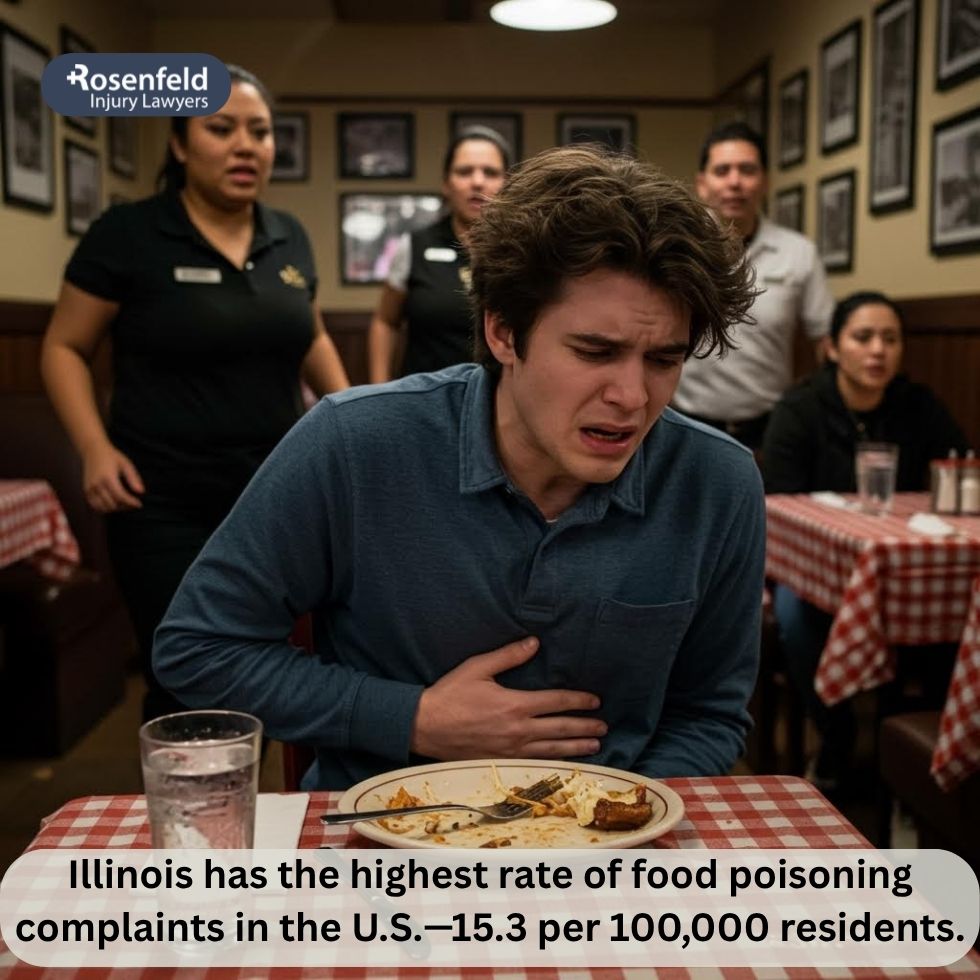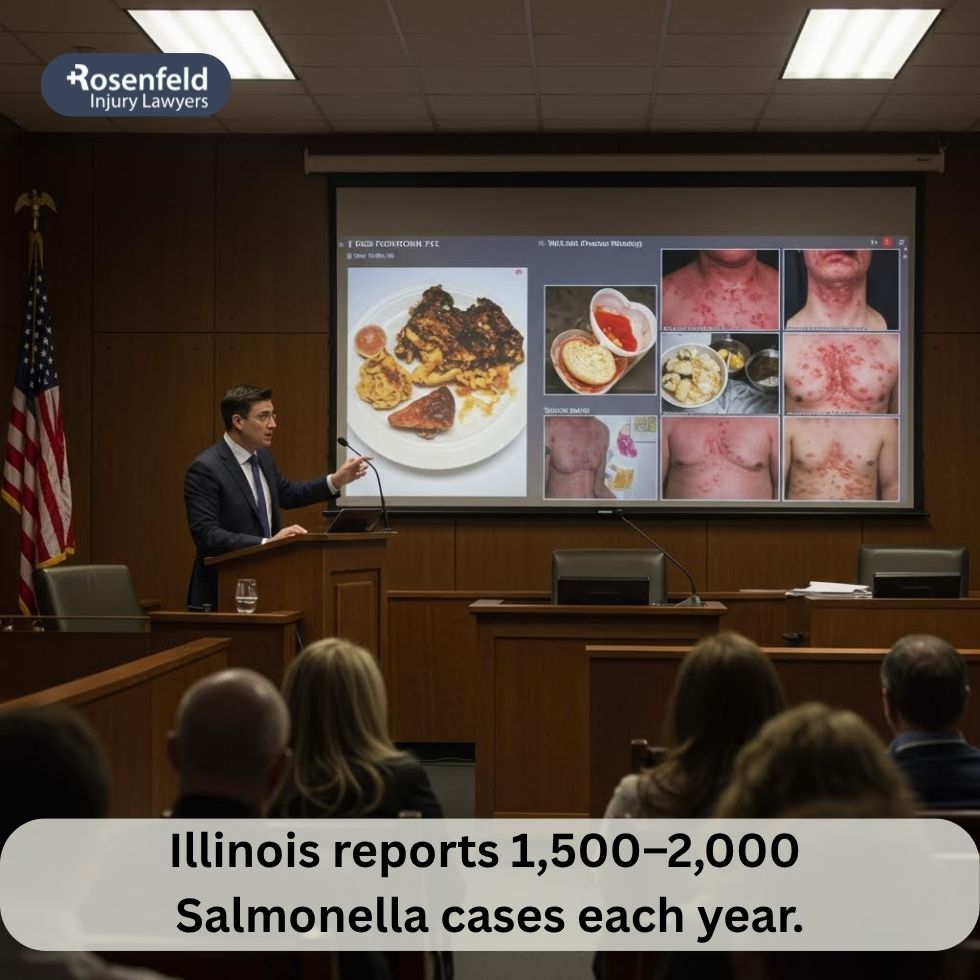Award-Winning Chicago Personal Injury Lawyer - Securing Justice
for Illinois Injury Victims - Over $450 Million Recovered
A Chicago food poisoning lawyer helps individuals who have suffered serious illness after consuming contaminated food. Whether the source was a local restaurant, grocery store, or food processor, foodborne illnesses like Salmonella, E. coli, and Clostridium Botulinum can lead to hospitalization, lost income, and lasting health issues.
If negligence played a role in your illness, you may be entitled to financial compensation, and an experienced attorney can guide you through the legal process. Book a free consultation today!
Some of the most common sources of contaminated food include the following:

When food poisoning occurs, a number of people can be liable, including the following:
The Food & Drug Administration (FDA) and American Medical Association (AMA) report that most foodborne illness cases are due to one of the following types:
E. Coli is a common bacterium present in the human intestines and a leading cause of food poisoning. Some forms of E. Coli can be dangerous and are most commonly found in contaminated water or food, especially unpasteurized milk or juices.
Norovirus is a group of illnesses that causes gastroenteritis and stomach cramps and is one of the most common sources of foodborne illness.
Salmonella bacteria can cause either Salmonellosis or Enteric Fever, both of which are illnesses caused by contaminated products like water and food. Common sources of Salmonella include raw or undercooked poultry products, eggs, fruits, and vegetables.
Campylobacter is a bacterium found in contaminated water, unpasteurized milk or cheese, and undercooked eggs or seafood.
Hepatitis A can be transmitted through contaminated food and water. Common sources of Hepatitis A include shellfish and salads with leafy greens.
They are most commonly found in unpasteurized raw milk and cheese.
Most of these foodborne illnesses can be prevented by practicing safe food handling and washing hands regularly. Some types of food, including raw vegetables, refrigerated foods, and meat, are also more prone to contamination.
Many foodborne illnesses present with the following symptoms:
Additionally, some of these severe symptoms may be long-term, regardless of whether or not you receive treatment. Additionally, more severe reactions of foodborne illness are possible and may lead to the following:
The Centers for Disease Control and Prevention reports that as many as 3,000 people die each year from foodborne illnesses.
Some populations are also at an increased risk of food poisoning. Children and elderly adults are more susceptible to foodborne illnesses.
Pregnant women are also at an increased risk of foodborne illness due to a weakened immune system, accounting for as many as 50% of annual listeriosis cases. Pregnant women may experience miscarriage, stillbirth, preterm labor or preterm birth, or low birth weight after developing food poisoning.
Pursuing a food poisoning lawsuit may be an option if you believe another party is responsible for serving or selling you contaminated meat or other food.
Here are a few ways our food poisoning attorneys can help with your case:
Our personal injury lawyers work to demonstrate the four important elements of a personal injury case.
We will work to demonstrate the restaurant or caterer’s duty to you and compile evidence showing how they failed in that aspect. We will also gather the necessary evidence to prove your harm or injury from foodborne illness, connecting how and for what you should be compensated.
Compensation available in food poisoning cases depends on various factors, including severity and types of damages. There is no set amount of compensation you can expect from a lawsuit. Here are a few things your lawyer will consider when calculating the value of your case.
Your settlement amount will depend on the severity of the injuries and their impact on your daily life. Food poisoning may lead to minor inconveniences like diarrhea and nausea for some. Severe cases, however, may result in life-threatening injuries, like meningitis or reactive arthritis. The severity of your injuries and how they impact your future will significantly affect the value of your case.
Food poisoning victims may experience economic and non-economic costs. Injured food poisoning victims can recover the following types of damages:
Economic damages are the financial costs that may occur following food poisoning. Common damages include medical treatment expenses, hospitalization costs, lost wages, or diminished earning capacity if you cannot work.
Non-economic damages are the non-financial aspects of legal claims. Common non-economic damages in a food poisoning case may include pain and suffering, emotional distress, and diminished earning capacity.
While less common, punitive damages are sometimes available in food poisoning cases. These damages are in addition to economic and non-economic damages and are designed to punish the supplier or manufacturer for gross negligence or misconduct.
Establishing liability is an important part of a personal injury case. If you were served raw or undercooked meat at a restaurant and later developed food poisoning, you may no longer have the evidence. Many food poisoning victims may not even know the cause of their symptoms, but may suspect food poisoning.
Some evidence is necessary since your lawyer must prove the responsible party was negligent or reckless. Proof of negligence may include the contaminated food, photos or videos of the staff not properly handling the food, or copies of your medical records.
When it comes to proving food poisoning, you need a personal injury law firm with experience handling these cases. Your legal team will evaluate your legal recourse options and help determine the best legal route.

Understandably, most people are focused on their health and well-being after the start of food poisoning symptoms. However, taking certain steps can help protect your legal rights if you decide to pursue compensation later.
Receiving medical care following common symptoms of food poisoning is crucial. While many cases of food poisoning may lead to only minor stomach cramps, others can be more serious. Prompt treatment can help minimize the severity of your symptoms. Also, medical records and proof of food poisoning may be important to your case.
If possible, gather any time-sensitive evidence that may not be available later. For example, if you still have access to the contaminated food, try to hold on to it. You might also capture photographs or videos of improper food handling. Witnesses can also be helpful if others can attest to the food safety protocols.
Contacting an experienced food poisoning lawyer can help protect your legal rights after suffering damages from a foodborne illness. A personal injury lawyer can help collect necessary evidence, consult expert witnesses, and negotiate a fair settlement covering your expenses. Our food poisoning lawyers will help you navigate your claim from start to finish.
Report the suspected cause of food poisoning to the local health authorities. This could help protect others from being exposed to the contaminated food supply. Your lawyer can also help report the case to the appropriate department. An official health department report could also be beneficial to your case.
In Illinois, the statute of limitations for filing a food poisoning lawsuit is generally two years from the date the illness occurred, as outlined in 735 ILCS 5/13-202of the Illinois Code of Civil Procedure. This applies to personal injury claims stemming from foodborne illnesses caused by negligence or improper food handling.
If the case involves a defective or contaminated food product, the same two-year limit applies under Illinois product liability laws. In the event of a wrongful death caused by food poisoning, families also have two years to file a claim under 740 ILCS 180/2 (Illinois Wrongful Death Act).
Because foodborne illness claims often rely on detailed medical records, laboratory test results, and traceback investigations to prove liability, it’s critical to speak with a Chicago food poisoning lawyer early. Delays can jeopardize your ability to recover compensation.
The cost of hiring food poisoning lawyers depends on many factors, including the details of your case. Rosenfeld Injury Lawyers understands the financial challenges that may occur following a foodborne illness. That’s why we offer a contingency payment plan, which means you don’t pay anything for legal representation unless we win your case.

If you became seriously ill after eating contaminated food, you may have grounds to take legal action and seek justice for what you’ve endured.
Whether your illness was caused by a restaurant, food manufacturer, or retailer, you shouldn’t have to suffer the consequences of someone else’s negligence. Food poisoning can result from dangerous pathogens like Salmonella, E. coli, or even fecal matter in the food you eat, often due to improper handling or production.
Under Illinois strict liability laws, you may be entitled to fair compensation for medical expenses, lost wages, and more. A skilled attorney from Rosenfeld Injury Lawyers can help you explore your legal options and fight for the maximum compensation available.
Call us today at (888) 424-5757 or fill out our online form.
All content undergoes thorough legal review by experienced attorneys, including Jonathan Rosenfeld. With 25 years of experience in personal injury law and over 100 years of combined legal expertise within our team, we ensure that every article is legally accurate, compliant, and reflects current legal standards.